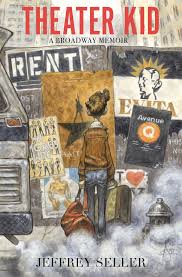Book Summary
Jeffrey Seller’s memoir, Theater Kid, chronicles his transformation from a shy, adopted gay teen in Detroit’s impoverished “Cardboard Village” to the Tony-winning producer behind Rent, Hamilton, and In the Heights. The book is structured in three acts, mirroring a Broadway play: his turbulent childhood, his early struggles in New York’s theater scene, and his rise as a visionary producer. Seller’s writing is raw and immersive, blending personal vulnerability with behind-the-scenes Broadway lore, making it a compelling read for theater enthusiasts and memoir lovers alike.
The heart of the book lies in Seller’s partnership with Jonathan Larson, the late composer of Rent, and later, Lin-Manuel Miranda. Seller doesn’t shy away from the emotional toll of Larson’s sudden death or the creative challenges of shaping groundbreaking shows. His storytelling balances triumph with tragedy, offering an unfiltered look at the tenacity required to succeed in theater. While the final section feels rushed—skimming over Hamilton’s meteoric success—the memoir remains a testament to resilience and artistic passion.
Key Themes
Identity and Belonging: Seller’s adoption, sexuality, and outsider status in his family frame much of the narrative. Theater becomes his refuge, a place where he can rewrite his story. His journey mirrors the themes of the shows he produces—Rent’s bohemian misfits, In the Heights’ immigrant struggles, and Hamilton’s revolutionary underdogs. The memoir underscores how art can transform personal pain into universal resonance.
Artistic Perseverance: From convincing a youth theater to ditch puppet shows to battling “puppet prejudice” for Avenue Q, Seller’s career is a masterclass in creative hustle. He demystifies producing, showing it as equal parts intuition and hard work—listening to artists, refining flawed material, and betting on unconventional stories. His mantra, “Can we do better?” drives every project, making this a must-read for aspiring creatives.
What Makes It Unique
Unflinching Honesty: Unlike glossy Broadway memoirs, Seller delves into unglamorous truths—his father’s volatility, his own envy and loneliness, and graphic accounts of his sexual awakening. One scene describes a sauna encounter with startling frankness, reinforcing the book’s theme of self-acceptance. These moments, while occasionally jarring, add depth to his portrait of a man who turned insecurity into artistic fuel.
Behind-the-Scenes Gold: Theater buffs will relish Seller’s insider stories, like Stephen Sondheim taking notes on an Apple Newton during Rent workshops or the tense negotiations with David Geffen for the Rent album rights. His account of Lin-Manuel Miranda’s early demos for Hamilton—particularly the lightning-bolt impact of “My Shot”—captures the magic of theatrical discovery.
Reader Reactions
Early reviews praise Seller’s “compulsively readable” prose and the memoir’s emotional resonance. Goodreads users highlight the Rent chapters as “heartbreaking yet inspiring,” with one reviewer noting, “It’s rare to see a producer’s memoir that feels this personal.” Critics at The Washington Post commend Seller’s “restraint” in recounting Larson’s death, while others wish for more depth on Hamilton’s cultural impact.
A recurring theme in reader feedback is the book’s relatability: “You don’t need to know Broadway to connect with this,” writes a NetGalley reviewer. Another adds, “His journey from Cardboard Village to the Tonys is a masterclass in grit.” A few note the abrupt shift in tone post-Rent, but most agree the memoir’s authenticity outweighs its pacing flaws.
About the Author
Jeffrey Seller is the only producer to mount two Pulitzer Prize-winning musicals (Rent and Hamilton). Born in 1964, he grew up in Oak Park, Michigan, and studied at the University of Michigan before moving to New York. His career began as a booking agent under Fran and Barry Weissler, where he learned the business side of theater. Seller’s knack for spotting talent—from Larson to Miranda—has reshaped Broadway, making him a pivotal figure in contemporary musical theater.
This memoir reflects Seller’s dual role as both insider and outsider. His adoptive family’s struggles and his queer identity inform his artistic choices, particularly his commitment to stories about marginalized voices. As he writes, “Theater gave me a home when I didn’t fit anywhere else”—a sentiment that echoes through every project he champions.
Memorable Quotes
“Theater gave me the chance to make something. It’s not easy; it demands creativity and commitment.”
“When I heard ‘My Shot’ for the first time, I was like, whoa. If In the Heights was a warm Caribbean embrace, ‘My Shot’ was lightning.”
